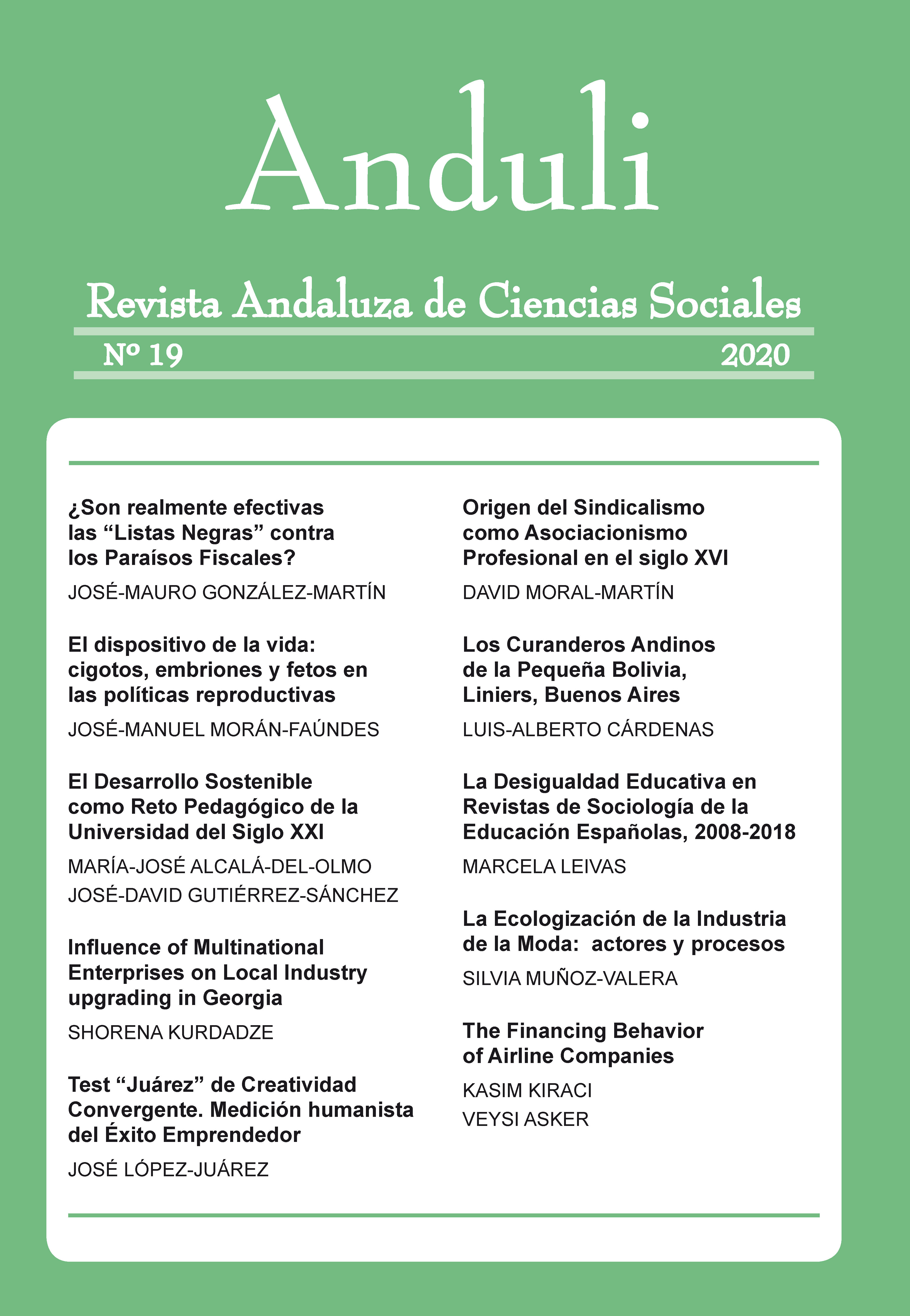Influence of Multinational Enterprises on Local Industry Upgrading in Georgia
DOI:
https://doi.org/10.12795/anduli.2020.i19.04Palabras clave:
Foreign Direct Investment (FDI), OLI paradigm, Transition Economy, Regression model, FDI motivationsResumen
The purpose of this research is to identify Foreign Direct Investments in Georgia and to study their influence on the country's economy by considering sector and country characteristics. To assess the impact of foreign direct investment on local economies, the author interviewed companies operating in Georgia in 2009-2016. Then, because the measurement scales used in the survey were mainly binary and ordinary, the author used ProbiT Regression and Ordered ProbiT Regression models. Results obtained from surveys and from analyses using regression equations show that natural resource-seeking companies use local goods and services in their production processes; this is expressed in their linkages with local suppliers and distributors. Conclusions are that foreign direct investments in Georgia have no significant influence on the development of local organizations and innovations. Although the Georgian market is small and the population is quite poor, market-seeking foreign direct investment is predominant. Multinational Enterprises that are directly engaged in foreign investments in Georgia (except for natural resources-seeking foreign direct investments), are rarely integrated with local markets.Descargas
Citas
Agosin, M. (2005). Foreign investment in developing countries: does it crowd in domestic investment? 149-162.
Borensztein, E., De Gregorio, J., & Lee, J-W (1998). How does foreign investment affect economic growth? Journal of International Economics, 45(1), 115-135.
Dunning, J. H. (2000). The eclectic paradigm as an envelope for economic and business theories of MNE activity. International Business Review 9, 163-190 .
Hu, A., & Jefferson, G. (2002). FDI impact and spillover: Evidence from China’s. The World Economy, 1063-1076.
Khaturia, V. (2002). Liberalization, FDI, and productivity spillovers: An analysis of Indian manufacturing firms. Oxford Economic Papers, 688-718.
Kottaridia, C., Giakoulas , D., & Manolopoulosb, D. (2019). Escapism FDI from developed economies: The role of regulatory context and corporate taxation. International Business Review, 36-47.
Kurdadze, S. (2018, June). http://research.ciu.edu.ge. Retrieved from http://research.ciu.edu.ge.
Nistor, P. (2015). FDI Implications on BRICS Economy Growth. Procedia Economics and Finance, 981-985.
Lall, S. (1996). The investment development path: Some conclusions. In J. Dunning & R. Narula (Eds.), Foreign direct investment and governments: Catalysts for economic restructuring (pp. 423-441). London: Routledge.
Scott-Kennel, J. (2010). The impact of foreign direct investment on New Zealand industry. Retrieved from https://researchcommons.waikato.ac.nz/bitstream/handle/10289/4724/thesis.pdf?sequence=3.
Sikharulidze, Kurdadze, Tordinava. (2015). The Impacts of FDI on Domestic Investment (In Case of Georgia). SOCIÁLNO-EKONOMICKÁ REVUE, 35-40.
Sikharulidze, D. (2012). Motivations for foreign direct investment and their impact on Georgia’s economy. Economic and Business, 61-78.
Silajdzic, S., & Mehic, E. (2015). Knowledge Spillovers, Absorptive Capacities and the Impact of FDI on Economic Growth: Empirical Evidence from Transition Economies. Procedia - Social and Behavioral Sciences, 614-623.
Descargas
Publicado
Cómo citar
Número
Sección
Licencia
Las ediciones impresa y electrónica de esta Revista son editadas por el Editorial Universidad de Sevilla, siendo necesario citar la procedencia en cualquier reproducción parcial o total.
Salvo indicación contraria, todos los contenidos de la edición electrónica se distribuyen bajo una licencia de uso y distribución “Creative Commons Atribución-NoComercial-SinDerivar 4.0 Internacional” ![]() Puede consultar desde aquí la versión informativa y el texto legal de la licencia. Esta circunstancia ha de hacerse constar expresamente de esta forma cuando sea necesario.
Puede consultar desde aquí la versión informativa y el texto legal de la licencia. Esta circunstancia ha de hacerse constar expresamente de esta forma cuando sea necesario.
Los autores/as que publiquen en esta revista aceptan las siguientes condiciones:
- Los autores/as conservan los derechos de autor y ceden a la revista el derecho de la primera publicación, con el trabajo registrado con la licencia de atribución de Creative Commons, que permite a terceros utilizar lo publicado siempre que mencionen la autoría del trabajo y a la primera publicación en esta revista.
- Los autores/as pueden realizar otros acuerdos contractuales independientes y adicionales para la distribución no exclusiva de la versión del artículo publicado en esta revista (p. ej., incluirlo en un repositorio institucional o publicarlo en un libro) siempre que indiquen claramente que el trabajo se publicó por primera vez en esta revista.
- Se permite y recomienda a los autores/as a publicar su trabajo en Internet (por ejemplo en páginas institucionales o personales) antes y durante el proceso de revisión y publicación, ya que puede conducir a intercambios productivos y a una mayor y más rápida difusión del trabajo publicado (vea The Effect of Open Access).





